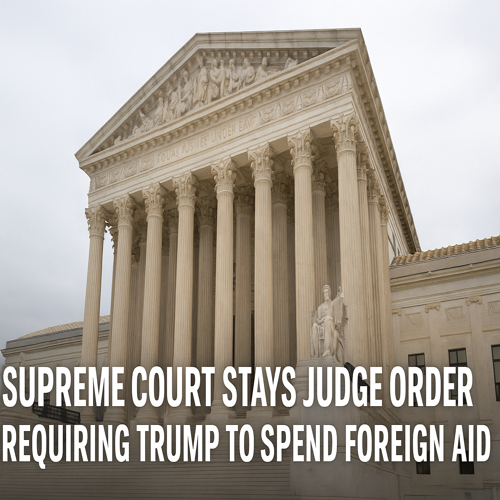The U.S. Supreme Court on Monday issued a stay on a lower court order that attempted to force President Donald Trump to immediately release billions in foreign aid funds, marking a significant victory for the administration in its effort to assert control over federal spending priorities.
The unsigned order halts a federal district judge’s ruling that had demanded the Trump administration disburse the funds in accordance with prior congressional appropriations. The case centers on whether the executive branch must automatically carry out every congressional spending mandate, or whether the president maintains discretion in directing and timing those outlays in light of national interest and constitutional authority.
By granting the stay, the high court signaled skepticism toward what many conservatives view as judicial overreach. The decision allows Trump to pause foreign aid spending while litigation continues, avoiding the immediate loss of leverage in ongoing foreign policy negotiations.
The original ruling came from a federal judge who argued that the executive branch had no authority to delay or reallocate congressionally appropriated funds. Critics say this approach dangerously elevates judicial power while handcuffing the president’s ability to make real-time decisions about America’s national security and international strategy.
Supporters of the administration note that Trump’s America First agenda places U.S. taxpayers and domestic priorities above foreign aid commitments. Forcing the president to release funds against his judgment would, they argue, undermine not only his constitutional role as Commander-in-Chief but also the will of millions of voters who elected him to recalibrate Washington’s longstanding foreign aid policies.
The Trump administration has consistently questioned the wisdom of funneling billions overseas while domestic challenges remain pressing. From securing the border to tackling inflation and rebuilding infrastructure, the White House maintains that its responsibility is first and foremost to the American people.
By intervening, the Supreme Court preserved the balance of power between Congress, the presidency, and the judiciary. The Constitution grants Congress the power of the purse, but it does not obligate the president to function as a mere cashier without discretion or oversight. As several constitutional scholars have pointed out, appropriations create the possibility of spending, not an absolute command to execute those expenditures on demand.
The dispute also highlights a deeper philosophical divide. Progressives often argue that foreign aid is an indispensable tool of diplomacy and global responsibility. Conservatives counter that such aid often becomes a blank check to corrupt regimes, produces little measurable benefit to U.S. taxpayers, and sometimes undermines American sovereignty by entangling the nation in endless overseas commitments.
Republican lawmakers largely welcomed the Supreme Court’s intervention, emphasizing that Trump was elected to challenge the status quo of endless spending abroad. They argue that the decision strengthens the executive branch’s ability to prioritize policies that put Americans first rather than bowing to pressure from global elites or activist judges.
Democrats, meanwhile, criticized the ruling, warning that the pause could jeopardize international programs and alliances. Yet those criticisms only reinforce the partisan split over foreign aid: whether the United States should continue underwriting much of the world’s welfare or instead adopt a leaner, more self-interested posture on the global stage.
For Trump’s supporters, the stay represents more than just a legal win. It validates the notion that the president has both the right and the duty to resist reckless spending mandates, especially when those mandates ignore fiscal responsibility and national sovereignty. The case may ultimately set precedent for how future presidents handle congressional attempts to micromanage executive policy.
At stake is not just the question of aid dollars, but the broader principle of executive independence. If lower court rulings like this one were to stand, every president could find himself judicially compelled to implement spending schemes regardless of the consequences for national security or economic stability.
The Supreme Court’s stay sends a strong message: decisions about foreign aid and U.S. taxpayer dollars cannot be dictated by unelected judges eager to advance political agendas. Instead, the balance of power must be preserved, with the president entrusted to weigh the risks, benefits, and timing of America’s global commitments.
For everyday Americans already burdened by taxes, inflation, and economic uncertainty, the Court’s ruling offers reassurance that Washington cannot simply bypass constitutional checks to ship billions overseas. Trump’s insistence on discretion in foreign aid spending reaffirms a long-overdue debate about where national priorities truly lie — abroad, or at home.

